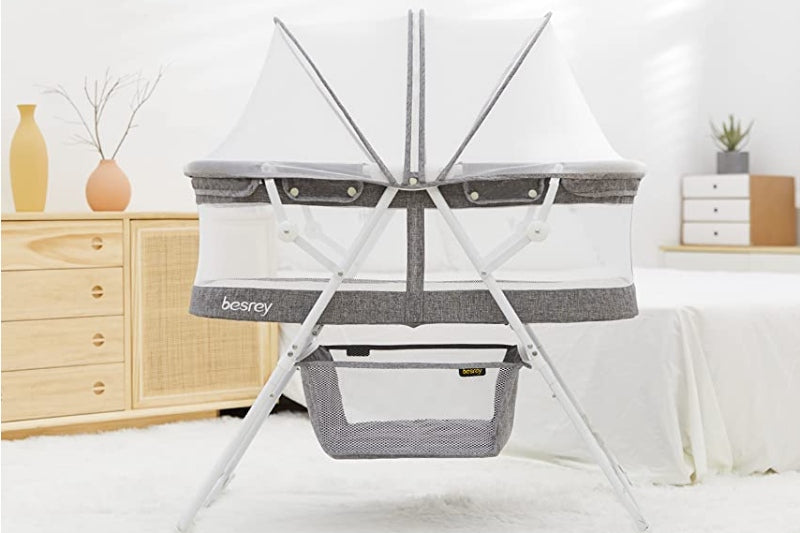
Do You Need a Baby Bassinet? Pros and Cons
A baby bassinet is probably the most talked about among many baby sleep options. If you have been asking yourself questions like "do I need a bassinet?" or what are the pros and cons of bassinets for newborns, you are not alone. Almost all new parents face the same confusion to decide what's right for their baby.
Why Use a Baby Bassinet?
Few things are more vital to a new parent than their baby's sleep. The American Academy of Pediatrics says the best place for that is a safety-certified crib, bassinet, or bedside sleeper in the parents' room.
A baby bassinet is the most convenient choice for parents who want to sleep with their baby beside their bed. The baby bassinet is very practical, especially for parents who are busy with work.
The baby bassinet can minimize the baby's reliance on their parents, free the parent's hands, and also have the effect of soothing and comforting. It is a good helper for modern families with babies.

Do Babies Have to Sleep in a Bassinet?
No. Babies are necessarily not required to sleep in a bassinet. It's just a sleep accessory that makes your child's and your life easier and safer. Whether your little one should sleep on it depends on various factors such as the baby's sleep habits, preferences, space availability, budget, etc.
Pros and Cons of Bassinets
The bassinet provides a smaller safe sleep space for newborns, but they grow up quickly. Babies usually transition out of a bassinet before they are 6-months old. The following is a start to break down the pros and cons of a bassinet.
Bassinet Pros:
Maximize convenience: A bassinet is helpful for new parents during the first few months of a baby. Newborns need to eat a lot, and feeding is easier without venturing too far from their beds.
Keep baby close: Although a baby monitor can help, nothing beats being able to take a quick look to your side to watch the baby's chest rise and fall. A bassinet makes it easy to do. It makes it easier to get you close to your baby.
Easily portable: A bassinet is great for traveling with your baby. You can take a travel baby bassinet with you anywhere, and it will be a safe and familiar place for your baby to sleep when you're visiting other places away from home. The bassinet is lightweight and can easily be moved around.
Cost-Effective: Because of its smaller size, a bassinet is often a cost-effective option for most families. You don't have to spend a lot of money to provide comfort for your baby. When compared to other popular sleeping options, they are very reasonably priced.
Better transition: Lastly, bassinets help babies transition into their cribs and acclimate to their new sleeping options once they are old enough to do so.
Take up less space in the room: Sometimes, a bassinet may be a good choice for new moms, particularly if they do not have much space for a large baby bed.
Bassinet Cons:
Bassinets are not long-lasting used. This is because you can only use the bassinet until your baby is 6 months old. You cannot use the bassinet for your baby once the weight limit has been reached.
Do I Need a Bassinet?
This is a question many new parents will face: If my baby can go into a cot from birth, why do I need a bassinet? Now it's time to break down the decision about needing and not needing a bassinet for you.
A Bassinet Might Be Right for You if You:
Want to keep baby close - A bassinet makes it easier to keep an eye on when your little one is beginning to fuss so you can gear up for a feeding. Keeping the baby close to you throughout the day can be practical and comforting.
Want to save money - It is more affordable than other sleep options.
Want for a long trip - A bassinet is usually lightweight, collapsible, portable, and, thus, travel-friendly.
Want to move easily at home - It is easier to move around from one room to another.
Save your room space - Generally, it doesn't take up a lot of space.
Want to Exercise your baby's independence - It trains your baby to sleep alone from a young age and makes it easier to transition into the crib when the right time comes.
Related Reading: How to Move Your Baby From a Bedside Crib to a Toddler Bed?
A Bassinet Might Not Be Right for You if You:
- You already have other sleep options.
- Your baby is over 6 years old.
- There is no way the bassinet can support your baby's weight.
- Your baby doesn't like being in the bassinet.
- Your baby also can sleep easily by using other sleep options.
- Your room is too small to fit a bassinet.
Word of Advice
Finally, if you're looking to economize, the Besrey portable baby bassinet cradle can be an ideal choice. The 1-inch thick cotton mattress pad serves as good support for the baby's hands and knees, with a night of sweet sleep. Sturdy construction makes it stable and keeps it safe for your baby.

The 4-sided mesh design, detachable mosquito net, and a basket to store can meet all your needs as newborn parents. In addition, the 2-level height is convenient for you to adjust according to your needs. This multifunctional bassinet cradle is easy to fold up, carry and store. You can use it as the baby's earliest bed home and then for trips to grandma's!
One way or another, every family has different needs when it comes to baby sleep, and you can depend on your needs to choose the right bassinet (and crib).





